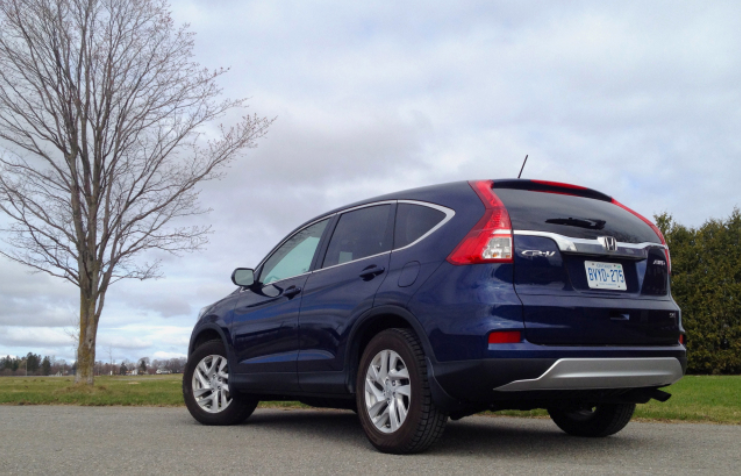Long-Term Test: 2015 Honda CR-V SE AWD – Part 2

Story and photo by John LeBlanc
There are plenty of good reasons why compact crossovers have become so popular with Canadians. Most can be equipped with all-wheel-drive for added on-road security; many offer fuel economy that’s darn-near equal to a compact car; and the majority are priced right in line with the average new car buyer’s budget. But perhaps the overriding reason why people are buying small SUVs — like our 2015 Honda CR-V SE AWD 60-day test drive subject — in record numbers is for their highly functional and versatile interiors.
We are now halfway through our two-month sojourn with Honda’s popular compact crossover. In our first instalment, we discovered the many updates for 2015 the Japanese automaker has wrought upon its fourth-generation CR-V to keep it competitive in a segment that also includes popular models like the Ford Escape, Toyota RAV4 and Mazda CX-5. And like those chief rivals, the CR-V’s five-passenger interior ends up being as useful and flexible as a Swiss Army Knife.
One of the longstanding appeals of the CR-V has been its anti-SUV-ness. For many buyers, it’s the Civic or Accord station wagon Honda stopped making decades ago. A great example of how car-like the CR-V is can be found in its front cabin.
For example, the Honda’s step-in height is relatively low. And this generation of CR-V is wider than its predecessor, which allows for a great view forwards from the front seats that are comfortable, supportive and look like they were plucked from the midsize Accord sedan. Plus, the dash-mounted gear selector frees up space for a centre console that can house mugs, phones, and a new-this-year centre console armrest.
Also of note: Our new-for-2015 and Canadian-exclusive $31,663 SE AWD (all prices include freight and pre-delivery inspection fees) long-term tester sits just above the $27,718 LX, and adds a seven-inch Display Audio system with HondaLink Next Generation (an app-based platform that connects to online content both inside and outside your car, from your smartphone using apps like Aha content).
We like the separation between the controls for the driver and passenger on the Honda’s centre dash. And the driver instrumentation and cabin controls are clear and easy to use, but some of the CR-V’s interior features seem cobbled together.
Take the pair of digital screens found in the centre console, for example. The large central screen offers mainly audio controls, but the graphics are Commodore 64-like lo-res, and some controls require the operator to use the small buttons on the left side of the screen that looks like they came from a 1980’s aftermarket stereo system (of particular annoyance is the tiny volume control).
The CR-V’s separate and smaller top screen offers vehicle information like average fuel consumption. The screen is far from the driver’s line of sight and would be better suited placed in the driver’s instrumentation cluster, as commonly found in other vehicles.
Even though there’s no third-row seating option, the CR-V does a great job carrying five comfortably. Front passenger room is on par with its Ford, Toyota and Mazda rivals. But where the Honda shines is in its exceptionally roomy back seat.
Dimensionally, the CR-V offers more rear hip and shoulder room than the Escape, RAV4 and CX-5. And we found it much easier to climb in and out of the back seat of this generation of CR-V than the last model. And once back there, three adults won’t feel cramped, even for long drives.
Although the rear seat could be adjusted fore-and-aft and offered four different seat-back angles in the third-gen CR-V, the current model allows you to fold the 60/40-split rear seats almost flat with an easy pull on a pair of levers that are accessible from the rear hatch area.
And the lack of a third-row seating option only makes the rear cargo area that much more useful in the Honda compact crossover — it’s also larger than the Escape and CX-5.
With the rear seats up, you’ll find 996 litres of room. Fold the 60/40-split seats down, and that space grows to 2,007 L — just the thing for long objects, like goalie sticks. Better still, the load space is very low, flat, and free of any intruding body parts.
All in all, it’s easy to see how well the Honda CR-V fulfills the typical compact crossover buyer’s desire to haul people and their stuff in a very comfortable and space-efficient package.
In our next instalment, we’ll be swapping out our long-term 2015 Honda CR-V SE AWD’s winter tires for more appropriate three-season rubber. A great time to see how well the Honda stacks up from the driver’s seat.




